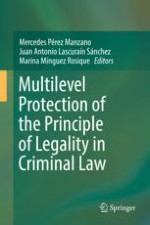2018 | OriginalPaper | Buchkapitel
The Annulment of the Parot Doctrine by the European Court of Human Rights. ECtHR Judgement of 21 October 2013: Much Ado Over a Legally Awaited Judgement
verfasst von : Susana Huerta Tocildo
Erschienen in: Multilevel Protection of the Principle of Legality in Criminal Law
Aktivieren Sie unsere intelligente Suche, um passende Fachinhalte oder Patente zu finden.
Wählen Sie Textabschnitte aus um mit Künstlicher Intelligenz passenden Patente zu finden. powered by
Markieren Sie Textabschnitte, um KI-gestützt weitere passende Inhalte zu finden. powered by
